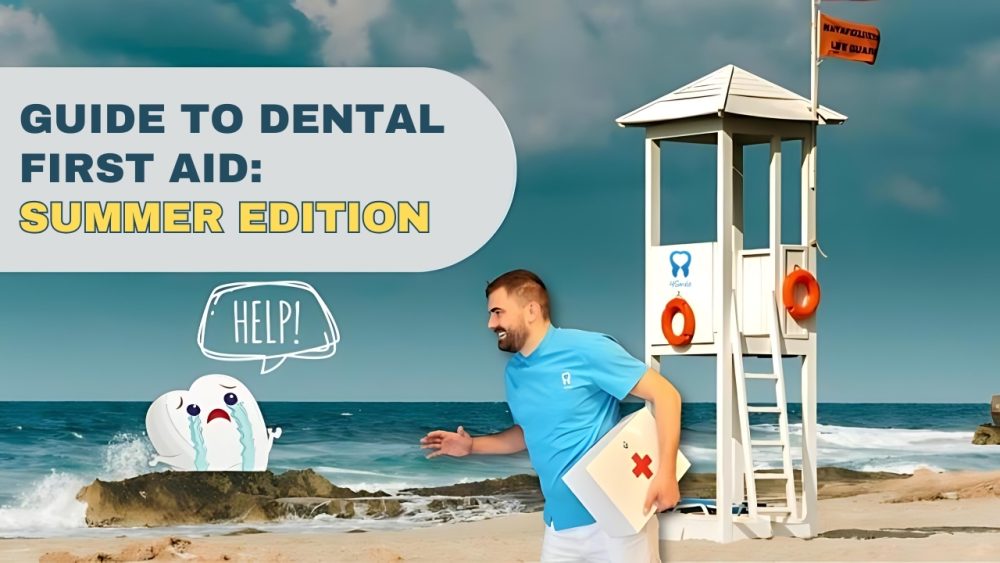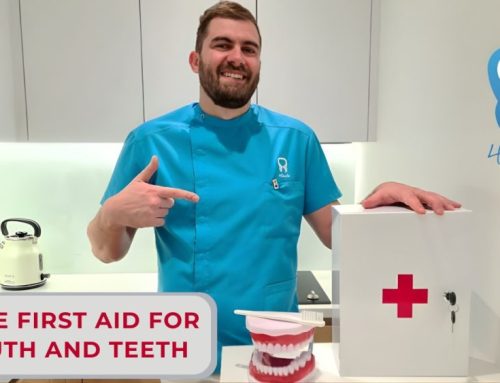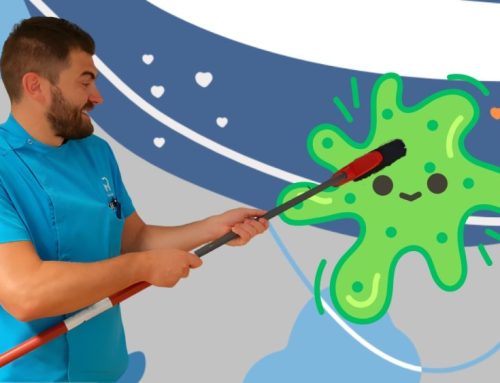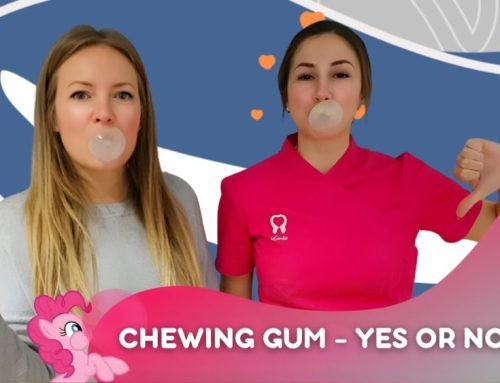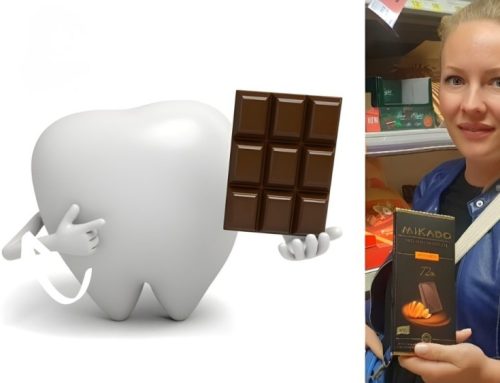You’ve arrived on vacation, and it’s finally time to relax!
Everything is going perfectly, but suddenly, a dental problem disrupts your holiday idyll.
Sudden toothache, a lost or broken tooth, a loss of a dental crown, and gum injuries are just some of the unpleasant issues that can surprise you. But don’t worry!
In this week’s blog from Dental Center 4Smile, we offer tips for first aid in various dental emergencies you might face while away from home. Even though visiting a dentist while traveling is sometimes challenging, don’t panic. Read the advice that can help you in the meantime.
PREVENTION IS THE BEST CURE
It’s better to prevent than to cure!
If you haven’t visited your dentist in over a year, we recommend scheduling a routine check-up before traveling. This way, you can avoid accidents that might occur due to material weakening over time, such as a falling out of tooth filling or the further development of dental diseases that eventually causes toothache.
If you plan to engage in aggressive beach sports, get a sports mouthguard as well!
Before you go on your trip, besides painkillers, we advise bringing a small dental first aid kit that will help you provide early assistance in case of an accident.
What does dentist in Europe, Ivan Antolković recommend for a first aid kit?
– Dental floss
– Sterile gauze
– Cotton
– Cooling gel
– Small tweezers
– Dental mirror (available in pharmacies)
– Medical gloves
– Mouth disinfectant (Parodontax 0.2% mouthwash)
FIRST AID IN CASE OF DENTAL EMERGENCIES
Regardless of the type of emergency, two rules apply to all:
- Don’t panic! Stay calm and rational to react quickly if necessary.
- Don’t ignore possible consequences of the incident! Even if the situation is not urgent, see your trusted dentist after returning from your trip.
Now that we’ve established that, here are tips for various emergencies:
TOOTHACHE?
If you didn’t bring painkillers with you, run to the nearest pharmacy!
Painkillers like ibuprofen or paracetamol are the best first aid for toothache.
If you prefer herbal medicines, try to get clove oil to ease the pain.
*Note: If the toothache is accompanied by bleeding or you’ve recently had dental surgery, avoid aspirin. Aspirin promotes additional bleeding.
LOST A DENTAL CROWN?
First, examine the area where the dental crown was to determine if it’s an emergency.
If you find that the dental crown or the natural tooth beneath the dental crown has a jagged edge or angle that can injure the tongue or cheek tissue, consider it urgent.
Other signs of urgency:
– Severe pain
– The dental crown is dangling or poses a choking hazard
– You can’t completely remove the dental crown
If the dental crown falls out entirely without significant pain, an urgent dental visit is often unnecessary.
However, plan to see your dentist within a week to protect the natural tooth.
For temporary aid of dental crown falling out, use denture adhesive like Corega – adhesive for dentures .
*Note: If the adhesive is applied to a prepared tooth beneath the dental crown, it should be used for a maximum of 10 days. After that, the natural tooth starts to decay.
To cover broken and sharp parts of a tooth, use Vaseline or dental wax.
WHAT TO DO WITH A DENTAL CROWN THAT HAS FALLEN OUT?
If you’ve found the dental crown, keep it and contact your dentist.
If the dental crown is not damaged, it can often be re-fixed in one visit to the dentist.
In the meantime, if the dental crown has fallen out in the area of:
– FRONT TEETH = Clean the area around the tooth and reattach the dental crown using temporary denture adhesive.
– BACK TEETH = Do not reattach the dental crown yourself as it might fall out again due to chewing forces.
If you can’t find the dental crown, a new one will need to be made.
Besides the basic handling of the dental crown, you should be careful while maintaining oral hygiene, avoid sticky, very hot, and cold foods, and use the opposite side of the jaw for chewing.
SWOLLEN GUMS?
If your gums are swollen, you can help yourself by:
– Rinsing your mouth with salt water to sterilize the oral cavity
– Soothing the gums by gentle brushing and flossing
– Applying a warm compress to the face to reduce gum pain
– Applying a cold compress to reduce swelling
– Using Parodontax Extra 0.2% mouthwash available in pharmacies
– Drinking more water to stimulate saliva production, which weakens bacteria in the mouth
With swollen gums, dentist in Croatia, Ivan Antolković, recommends avoiding irritants like:
– Strong alcohol-based mouthwashes
– Alcohol
– Nicotine products
FISH BONE STUCK IN YOUR GUMS?
A fish bone initially causes minor irritation, swelling, and bleeding, but if deeply embedded, it can cause an abscess.
Since fish bones are brittle, do not use force to remove the bone!
Avoid trying to remove it with a toothbrush, floss, toothpick, etc., to ensure no part of the bone breaks and remains trapped in the gum tissue.
To prevent an abscess and relieve the discomfort of a stuck fish bone, take the following steps:
– Use warm salt water – Mix a teaspoon of salt with a glass of warm water and gently rinse the area where the fish bone is trapped. This will reduce swelling, helping you better locate and remove the fish bone.
to reduce swelling, helping you locate and remove the bone.
– Use an oral syringe – Once the swelling has gone down, use a mouth syringe filled with warm water to flush out the trapped fish bone. Aim the spray at the area where the fish bone is trapped and try to gently push the bone out of the gum tissue with each stream of water.
If you can’t remove the fish bone yourself, contact your dentist as soon as possible.
BROKEN TOOTH?
When a tooth breaks, it is necessary to assess the urgency of the situation.
Any serious cracking of a tooth caused by accidents, with excessive bleeding and uncontrollable pain, should be treated as an emergency.
If it is not an emergency, before you take steps to help yourself, it is important to:
– Rinse your mouth over a container with a closed bottom to save tooth fragments.
– Place the fragments in a cup of milk or saline solution (1 cup water + 1 teaspoon salt).
Saving the fragments of a broken tooth is crucial as your dentist might be able to use them to reconstruct your tooth.
Once you have removed the fragments, you can provide first aid for a broken or cracked tooth by:
– Relieving the pain with ibuprofen or paracetamol
– Rinsing your mouth with warm salt water
– Applying the pressure to stop bleeding
– Using a cold compress outside the affected area to prevent swelling
– Covering sharp parts of the tooth with dental wax to avoid injury
KNOCKED-OUT TOOTH?
A knocked out tooth is treated as an emergency.
Stay calm and act quickly!
The best chance for successful re-implantation of a knocked out tooth is within 15 minutes to 1 hour after the injury has happened.
In case of knocked out tooth, take the following steps:
– If the tooth is clean, try to reinsert it into the socket. While reinserting the tooth in your gum socket, ensure the tooth is correctly oriented and avoid touching the root. Don’t force it!
If reinsertion is not going smoothly, store the tooth to keep it moist until you reach a dentist.
– Store the tooth under the tongue in saliva, in milk, or saline solution.
Do not use regular water or wrap the tooth in a tissue!
*Note: If far from a dentist, buy a special preservation solution from a pharmacy.
LOST A DENTAL FILLING?
In the event of a dental filling falling out, we recommend that you definitely contact your dentist if you feel pain.
Until you see a dentist, dentist Ivan Antolković recommends protecting the tooth from damage by:
– Gargling with salt water to keep the area clean (1/2 teaspoon of salt in a cup of warm water)
– Maintaining oral hygiene, brushing gently around the affected area
– Avoiding chewing in the area around the exposed tooth
– Using dental wax to protect the exposed tooth
DENTAL ABSCESS?
You need to visit your dentist to treat a dental abscess as it is a consequence of a dental infection worsening over time.
However, before going to the dentist, you can help yourself by:
– Taking the painkillers
– Rinsing your mouth with salt water (1/2 teaspoon of salt in a cup of warm water)
– Gargling with peppermint tea
A common symptom of an abscess is the appearance of a fistula – a pus-filled bump on the gum.
Due to the fact that the fistula is filled with bacteria, puncturing it by yourself is not recommended!
Puncturing the fistula provides only temporary relief as it will recur until treated with antibiotics and visiting the dentist.
SUFFERING FROM CANKER SORES?
Dr. Antolković recommends AftaMed gel for canker sores.
Canker sores are inflammatory lesions in the mouth.
AftaMed gel immediately reduces pain, helps heal sores, and reduces their number by regulating inflammation and rehydrating tissues thanks to hyaluronic acid. AftaMed gel is alcohol-free.
If AftaMed is not available, you can help yourself with:
– Baking soda paste
– Propolis drops or spray
– Black or green tea for disinfection
– Chamomile and sage tea for pain relief and faster healing
Whatever happens, don’t let panic over dental accidents ruin your well-deserved vacation. In emergencies, stay calm and seek help. For any advice, you can always contact your trusted dentist.
Dental Center 4Smile is always available to its patients, even virtually.
We hope that our tips will help you to prevent accidents and alleviate discomfort in non-urgent situations. The 4Smile team wishes you a pleasant vacation!
